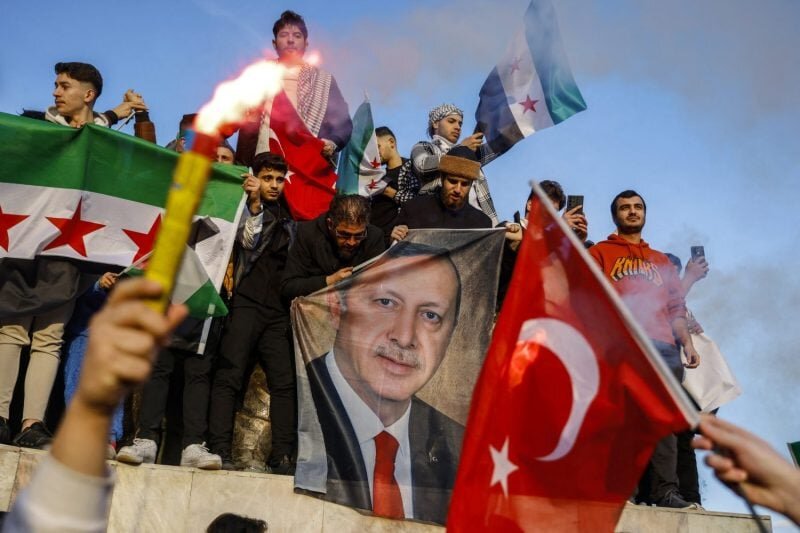Irans role in the geopolitical shift of West Asia
Iran's role in the geopolitical shift of West Asia
MADRID – The fall of Bashar al-Assad's government in Syria and the subsequent transformation of the country into a "failed state" —a fragmented territory torn by the actions of various internal groups and foreign powers such as Turkey, the United States, Qatar, and Israel— has dealt a blow to one of the strategic pillars of Axis of Resistance.

In recent days, the intensification of Israel's operational presence in Syria has highlighted a significant shift in its regional strategy. Israel's efforts to destroy defensive infrastructures and key strategic points, along with its army's ground incursions into Syrian territory —even beyond the occupied Golan Heights— reflect Tel Aviv's determination to establish a "new order" in West Asia. This advance marks a clear escalation in the region's geopolitical confrontation, posing a direct threat to the interests of the Axis of Resistance.
In addition, a forced demilitarization of Syria is being witnessed, under the direct intervention of Israel and the United States. According to international analysts, the goal of this strategy is to ensure that Syria lacks the weapons and military infrastructure capable of challenging Israel’s interests in the region. The attacks are justified in the name of Israel’s security and the fight against alleged terrorist threats, although many believe the true intention is to consolidate broader geopolitical control over the area.
In a later phase, the active participation of the United States and the European Union is expected in what is referred to as "state reconstruction" and "security sector reform" in Syria. This process will include the creation of a new Syrian army, trained and overseen by foreign forces. According to various sources, the primary mission of this new force will be to control the internal movements of the population and suppress any form of dissent that may arise against Israeli influence or Western presence in the region.
In this scenario, it is urgent for Iran to conduct a strategic review in order to halt, and even reverse, the Israeli offensive. The project of a "new order in West Asia," promoted by Israel, has made significant progress with the fall of Bashar al-Assad's government. However, according to several Iranian analysts, the ultimate victory still seems distant.
In this context, Iran could reverse the situation through the design and implementation of an appropriate strategy, as it did after the U.S. occupation of Iraq and Afghanistan, when the management of the regional security order shifted to the hands of the Axis of Resistance.
According to Iranian analysts, one of the key elements in this new strategic phase should be a shift in focus towards Saudi Arabia and the United Arab Emirates. While, in general terms, both nations have been part of the Western containment strategy, they could establish temporary tactical cooperation with Tehran to alter the current strategic equation in the region.
The analysts point out that Turkey's actions, as one of the key vertices of the power triangle in Western Asia alongside Iran and Saudi Arabia, have allowed Ankara to take the lead in recent years. During this transitional phase, Turkey has managed to surpass Saudi Arabia both politically and militarily. Moreover, it has alleviated one of its main security concerns in the region—the situation in Syria—enabling it to consolidate its influence and position within the region.
These sources emphasize that the current geopolitical context represents an opportunity to forge a model of cooperation between Tehran and Riyadh. This rapprochement could mark an unprecedented collaboration in the region, where Iran, Saudi Arabia, and the United Arab Emirates work together to manage Turkey's growing influence in West Asia. In this sense, a new phase is opening in the regional power dynamics, where traditional alliances could be challenged by strategic cooperation between actors who have so far been adversaries.
The main concern of the Islamic Republic in the regional sphere lies in the urgent need to develop a new strategy to counter Israel's plans in the region. According to sources close to Iranian diplomacy, Israel's goal would be the creation of a new West Asia under its hegemony, supported by the United States.
International political experts, such as Mohsen Jalilvand, argue that in its attempt to contain China, the United States will redirect its focus toward East Asia, which would imply delegating responsibilities in Western Asia to Israel. According to this analysis, the United States is entrusting Israel with the task of managing the region's conflicts and geopolitical dynamics to concentrate on other strategic fronts more aligned with its interests in the Pacific.
In Israel, supported by the United States, there is growing conviction that the current context presents a unique opportunity to redefine the political map of West Asia. This strategic shift aims to transform the power equation in the region and dismantle the Axis of Resistance, an alliance united by a common goal: to reduce and counter Israel's influence. According to analysts, Israel's pursuit of regional hegemony involves a series of military, political, and diplomatic moves designed to weaken key actors that oppose its influence, including Iran, Syria, Lebanon, and Palestine.
Despite Israel's attempts to reshape the region according to its own interests, Iran has made it clear that it possesses the political and military capabilities necessary to challenge these objectives. Additionally, the potential for forming an alliance with Saudi Arabia and the United Arab Emirates to counter Turkish expansionism could strengthen Iran's long-term strategy. This cooperation, though unprecedented, would represent a significant shift in the regional dynamic, creating a united front capable of addressing emerging threats and balancing Turkey's growing prominence in the geopolitical context of West Asia.
source: tehrantimes.com